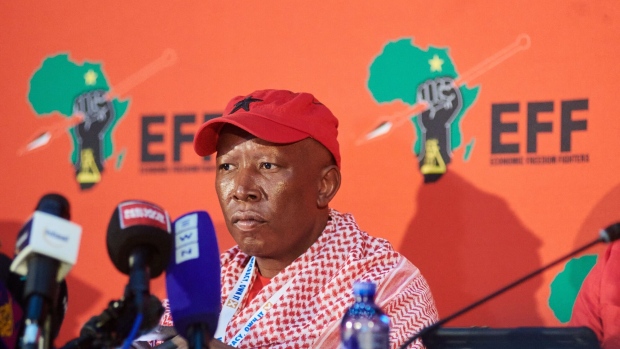(Bloomberg) — South Africa’s leftist Economic Freedom Fighters said it won’t join a government that includes the centrist Democratic Alliance and Freedom Front Plus parties, potentially derailing a proposal for a broad-based alliance to rule the country. The rand strengthened.
President Cyril Ramaphosa on Thursday invited opposition parties to join the African National Congress in a government of national unity after last week’s elections failed to produce an outright winner.
“We do not want to form any part of a government with representatives of the White colonial and apartheid system,” EFF Deputy President Floyd Shivambu told reporters on Friday in Johannesburg. “We’re not going to sit alongside the Democratic Alliance and Freedom Front Plus in government as the Economic Freedom Fighters.”
The rand gained as much as 1.1% as Shivambu spoke and traded 0.5% stronger at 18.8747 per dollar by 4:45 p.m. in Johannesburg. Founded in 2013, the EFF wants all land to be placed under state custodianship and for mines and banks to be nationalized — policies that investors and business leaders say would be disastrous for Africa’s largest economy.
“We are relatively positive,” said Kieran Curtis, director of investment at abrdn in London. “South African assets have very undemanding valuations and the outcome looks very likely to be something close to continuity. Maybe there will be a more positive outcome than that, but I think the chance of a more negative outcome looks quite low in the short term.”
The ANC has won more than half the vote in every previous national election held over the past three decades, but saw its support slump to 40.2% amid widespread disgruntlement over power cuts and high levels of poverty and unemployment.
Nelson Mandela led a unity government after the end of White-minority rule. It included the National Party, which governed during apartheid, and the Inkatha Freedom Party. It lasted from 1994 until 1997, when the NP pulled out. The difference then was that the ANC had an outright majority and could rule on its own, whereas now a walk-out by a larger party would collapse the government.
“We are opposed to the government of national unity in as far as it resembles what was concocted in 1994,” said Shivambu, whose party secured 9.5% backing in the election.
Details and modalities of how the proposed new government will work still have to be negotiated. One possible scenario would be for Ramaphosa to retain the presidency and allocate seats in his cabinet to parties in proportion to their share of the vote. Deals could also be struck to share out executive positions in those provinces where no party won an outright majority.
The DA, South Africa’s biggest opposition party, has previously said it isn’t prepared to work with either the EFF or uMkhonto weSizwe, a new party led by former President Jacob Zuma that also favors nationalization.
A DA document that was intended to guide its talks with the ANC states that its participation in a unity government is conditional on the central bank’s independence being guaranteed and that the new administration be corruption-free. The three-page document didn’t mention the party’s opposition to national health insurance and black empowerment laws — two of the ANC’s signature policies.
“No policy agenda will succeed unless it can be implemented effectively and protected from the destructive effects of corruption and political interference,” the party said in the document, which was seen by Bloomberg and confirmed as authentic by two senior party officials.
Sign up here for the twice-weekly Next Africa newsletter
The omission may help make it easier for the ANC to team up with the DA. While President Ramaphosa’s allies favor a partnership with the main opposition, his detractors want a government made of leftist parties and reject a tie-up with the DA, which they see as an organization that represents the interest of the White minority and big business – a characterization its leader John Steenhuisen rejects.
A DA spokeswoman didn’t respond to a call seeking comment.
The DA also wants the ANC’s policy of appointing party officials to top civil service positions, known as cadre deployment, outlawed and for the government to bring the budget deficit down to 3.5% of gross domestic product or less within three years.
The DA’s other priorities, many of which align to those of the ANC, include:
- Spinning-off the state power utility into generation, transmission and distribution units.
- Allowing private firms to run ports.
- Establishing a water regulator.
- Title deed reforms to expand land ownership.
- Reforming the mineral-rights system.
- The rapid expansion of spectrum availability.
- Giving provincial governments more power including the right to run their own passenger rail systems and police forces.
–With assistance from Ana Monteiro, Colleen Goko, Arijit Ghosh and Paul Vecchiatto.
(Updates with detail, comment throughout.)
©2024 Bloomberg L.P.
